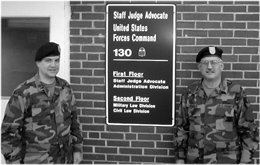|
 Closing
Shop Closing
Shop
|

|
| Preparing
for activation is difficult – especially for small firms and sole
practitioners. These pointers can help ease the challenge. |
Preparing to Mobilize
Terence McArdle has split his 22-year law career almost evenly between
private practice and the military. A Vietnam vet when he went to law school,
he graduated in 1979. He then went to work in his father's law firm in
La Crosse and joined the Army National Guard. After his father died, McArdle
decided he needed a career change. With 10 years of private practice behind
him, he took a job as a full-time Guard attorney at headquarters in Madison.
"I'd expected to come down here for a three-year tour," he says. "That
was 12 years ago." McArdle now holds the rank of Deputy State Judge Advocate,
reporting directly to the Guard's head lawyer. "One of the main things
we do here," he says, "is to make sure that soldiers are ready for mobilization."
"For lawyers, the readiness steps vary depending upon type of practice.
Sole practitioners and attorneys in small firms face the toughest challenges,"
McArdle says. He offers a few basic pointers on preparing for activation:
• Have a good tickler system. Every lawyer needs a system
to stay on top of court dates and deadlines. That's all the more critical
when you face turning over cases to other attorneys. Safeguard against
anything falling through the cracks. "Inform your clients of those dates,
too," McArdle advises, "so they know they'll have to make sure things
get done on time."
• Enlist backup attorneys. The number you need depends upon
your practice. For instance, you might farm out family law cases to one
lawyer, probate work to another. In some communities, you may have to
look out of town to find the right attorneys. "Keep track of who's doing
what in your county bar," McArdle suggests.
•Tell your clients. When should you tell clients that you
might be leaving? "There's no hard-and-fast rule," McArdle says. "Have
a letter ready, to be sure. But he cautions against telling clients too
much too soon and unnecessarily upsetting them - especially in a time
when people have plenty to be upset about already. "Most units get a warning
order some days before the actual orders to report for duty," McArdle
says. "When the unit gets the warning order, it informs all its members.
At that point, it would be proper to inform your clients."
For more information on preparing for mobilization, see www.abanet.org.
|
